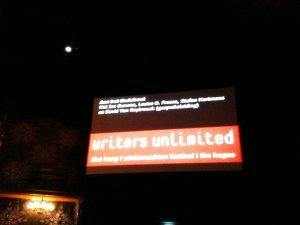Hoe kom je geestelijk weer thuis na een oorlog? David van Reybrouck in gesprek met Stefan Hertmans en Ian Buruma
Wortels, aardappelen, misschien wat bleekselderij en een scheutje reuzel, dit was het eentonige winterdieet van de onderklasse op het Vlaamse platteland eind negentiende eeuw. Maar, zo schetst hoogleraar en gastspreker Louise O. Fresco in haar openingscolumn, tegenwoordig is het de elite die volgens de seizoenen wil eten, want zelfgekozen schaarste maakt tenminste exclusief. Dat verse aardbeien het hele jaar door in iedere supermarkt te krijgen zijn, creëert dus een slag mensen die een zelfgekozen armoede opzoeken. Alles om je maar te kunnen onderscheiden.
Het is dit spanningsveld, tussen de diepe armoede van de negentiende eeuw en de razendsnelle ontwikkeling naar de vanzelfsprekende welvaart van het nu, die de aftrap vormt in het gesprek tussen drie heren: de schrijvers David van Reybrouck (tafelheer), Stefan Hertmans en Ian Buruma. Want kun je je eigenlijk nog voorstellen hoe het is om in armoede te leven? Of om oorlogsmisdaden te zien, ondergaan of begaan? Het is onmogelijk om te weten of je goed of slecht zou zijn geweest en aangezien de heren, en bijna alle aanwezigen, zijn opgegroeid in de langste vreedzame en welvarendste periode van de Europese geschiedenis, kunnen ze slechts speculeren en reconstrueren en zijn zich daar nadrukkelijk bewust van.
Hertmans schreef in de bekroonde roman Oorlog en Terpentijn over hoe zijn grootvader opgroeide in het straatarme Gent en in de loopgraven van de Eerste Wereldoorlog terecht kwam. Gebaseerd op cahiers vol aantekeningen van grootvader zelf. Oorlogsboeken van Vlaamse hand vlak naar de Eerste Wereldoorlog zijn er niet, met uitzondering van de poëziebundel Bezette stad van Paul van Ostaijen. Pas de generatie van de kleinkinderen, Hertmans, Mortier en meer, blikt terug. Buruma, wiens vader in Duitsland dwangarbeid verrichtte herschrijft de geschiedenis van net na het einde van de Tweede Wereldoorlog, toen bevrijders niet alleen helden waren maar ook grove misdaden pleegden.
Overlevenden herinneren, nabestaanden herdenken
Het gesprek is een beschaafde uitwisseling van gedachten omtrent zware onderwerpen: oorlog, schaarste, geweld en armoede. De (klein)zonen constateren dat herdenking iets is van ‘zij die het niet meegemaakt hebben’. Of zoals Stefan Hertmans het stelt “herdenken is woorden geven aan een verleden”. Overlevenden hebben, zeker tijdens en vlak na een wereldoorlog zodanig hun energie nodig dat woorden niet de eerste prioriteit zijn. Armoede en leed laten weinig ruimte voor introspectie. Zijn grootvader schreef het verhaal pas na vijftig jaar op en het kostte Hertmans nog eens drie decennia om zich ertoe te kunnen zetten.
Buruma vertelt op zijn beurt hoe zijn vader na de oorlog terugkeerde en in Utrecht alsnog ontgroend moest worden bij een studentenvereniging. Er was geen taal om te vertellen wat er gebeurd was en men wilde het liefst zo snel mogelijk dat alles weer ‘normaal’ was na de oorlog, teruggrijpend op vernederende rituelen alsof er niets veranderd was. Het herdenken en terugkijken op de Tweede Wereldoorlog kwam pas in de jaren zestig langzaam op gang.
Nederland deportatieland
In twintigste eeuw was er niet alleen sprake van een in de geschiedenis ongekende stijging van welvaart en levensverwachting, maar ook van een ingrijpende kentering op het gebied van moraal. Dixit Hertmans. Zijn brave grootvader die zich altijd als eerste meldde voor een gevaarlijke verkenning met een ‘ oui monsigieur’ wordt door veel lezers nu als een volgzame dwaas ervaren. Sinds de jaren zestig is moed ‘fuck you’ zeggen tegen het gezag.
En passant werpt de discussie over een andere mentaliteit een nieuw licht op de vraag waarom uitgerekend in Nederland verhoudingsgewijs zoveel Joden zijn gedeporteerd. Buruma wijt het aan het gebrek aan natuurlijk wantrouwen in de staat. Daar waar de burgers van landen als België en Frankrijk al door de Eerste Wereldoorlog ervaren hadden waartoe het gezag in staat was en een rebelse en kritische mentaliteit ontwikkelden (‘sadder but wiser’), volgden de Nederlanders nog braaf en gedwee de instructies van hogerhand op.
Wij zijn allemaal freudianen
Hoe bereikten onze voorouders nu loutering of closure zoals we dat tegenwoordig noemden? Hoe voelden mensen zich weer ’thuis’ in hun leven? Hoe pak je de draad van de alledag weer op en verhoud je je tot een veranderde wereld? Men sprak toen nog geen Freudiaans zoals Hertmans prachtig verwoordt en ‘erover praten’ was dus moeilijk. Herinneren deed men in stilte. Taal schoot tekort. Na de Eerste Wereldoorlog gingen veel mannen schilderen of bij een muziekvereniging, een ongetwijfeld helende uitlaatklep. Het schrijven, het herdenken, dat kwam later pas. David van Reybrouck eindigt dan ook met de woorden: “Alles gaat voorbij, behalve het verleden.”

